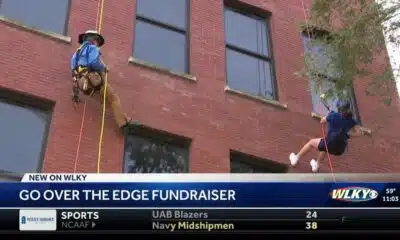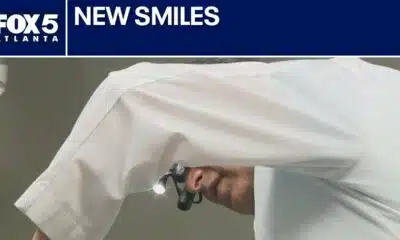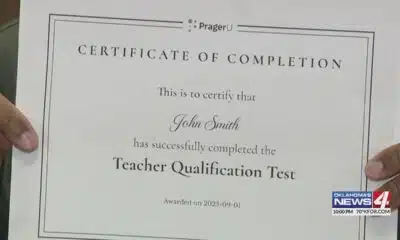News from the South - Kentucky News Feed
Kentucky clinic treats child abuse (and tries to prevent it)
by Sarah Ladd, Kentucky Lantern
May 28, 2025
This story discusses child abuse. Report child abuse to Kentucky’s Statewide Child Abuse Hotline at 1-877-597-233.
LEXINGTON — Before Kosair for Kids Center for Safe and Healthy Families was founded in 2024, Kentucky children with bruised faces or sexual trauma waited for medical care alongside those with the flu.
This was “not trauma-informed care,” said Barry Dunn, the president and CEO of Kosair for Kids, which then put up $2 million to do something about the problem. Kosair for Kids is a Louisville-based organization that advocates for children’s wellbeing.
“Do we want a child who has just experienced the worst moment of their life — who has just been sexually assaulted — being seen … beside a kid who’s there because the child is running a fever?” Dunn said. “Not to minimize the fever, but as you’re talking through what happened to you being sexually or physically abused, do we really want that to happen in an ER setting?”
The obvious answer to Dunn and others was no, children facing the worst moments of their lives need personalized and private care. It also helps if there is a therapy dog whose entire job is to comfort traumatized children.
Dr. Christina Howard, a forensic pediatrician and Kentucky’s leading expert on child abuse, said the sterile ER is just “not an ideal” place for sensitive conversations about abuse.
“As a parent, if you see a kid whose face is just bruised, it’s hard to look away,” she said. “It’s hard to not pay attention to that and want to do something.”
It also was not a comfortable setup for much-needed mental health services, Howard said.
The Kosair for Kids Center for Safe and Healthy Families at the University of Kentucky Hospital was built with this need for privacy and trauma-informed care for the smallest patients in mind.
Now a year old, the clinic is a model for treating abuse — and trying to prevent it.
‘It’s really, really hard to be a parent.’
Anyone, including parents, can bring a child to the clinic for treatment. A “large majority” of patients are referrals from the UK Hospital, which has consulting protocols when children come in with certain injuries, Howard said.
The Department for Community Based Services, in the Cabinet for Health and Family Services, may refer children to the clinic, as well as concerned caregivers, police and other hospitals throughout the state.
The clinic has three exam rooms, including one with a shower — which sexual abuse survivors can use after a rape kit, for example — and therapy rooms. One is a “play therapy” room for younger children.
Another therapy room is where non-offending caregivers can get mental health treatment, a much-needed component because a lot of child neglect and abuse instances aren’t straightforward cases of cruelty, Howard said.
Many other factors play a role, she said — addiction and other mental health issues are key culprits, as well as child care challenges.
“We’re in a world where it’s really, really hard to be a parent, especially to be a single parent,” Howard said.
Child care is expensive, she said, which sometimes forces parents to leave children in suboptimal situations so they can earn a paycheck to support the family.
“It’s one of those (decisions): cheap child care that might not be the safest, or work.”
Howard said parents in such situations need support, including more affordable child care.
“It’s pretty much on a daily basis, where I will see a single parent asking how other parents are surviving? ‘How are they putting food on the table and getting child care?’” she said.
Plentiful data backs this struggle up. A 2024 survey of 1,357 parents from 88 Kentucky counties showed that some parents had already chosen to exit the workforce because of inaccessible child care.
Many families put off having more children, delayed big purchases and sacrificed health care needs because of child care complications, the Lantern previously reported.
Child care centers closing during the COVID-19 pandemic resulted in “fewer eyeballs on kids,” Dunn with Kosair explained. It’s also difficult to get people to work in child care facilities, he said, due to the industry’s low wages. An increase in wages helps with retaining good workers — but parents bear the cost.
“For some it’s just unsustainable,” Dunn said. “It’s not possible to pay those rates.”
That difficult choice between work and child care puts children in jeopardy, Dunn said. A lot of abuse cases happen when a working parent has to leave their child with a boyfriend or girlfriend, he said, and the child is then harmed.
“There is a misconception out there that child abuse is perpetrated by random strangers that one has never met, and they just show up out of the blue in (an) ice cream truck or van going down the road and somebody steals the child,” he said. But “the majority of child abuse is perpetrated by someone who knows the child. It’s family, it’s a friend. It’s someone that you thought was safe, but it turns out they were not.”
Meanwhile, more than 85% of the clinic’s patient population is enrolled in Medicaid, a program currently under federal threat of deep cuts.
Howard cannot bill parents — even if they are the perpetrators of child abuse — but she can bill Medicaid and said providers like her need an intact Medicaid reimbursement.
Fentanyl and guns
In Howard’s Lexington office, she keeps a clear plastic tub full of gun locks and gives them out for free to people who need them. Guns remain the leading cause of death for children and teens in the United States.
“We do, unfortunately, see a lot of pediatric firearm injuries as well unintentional ones. And so if we can prevent that, then that would be the best course,” Howard said. “Storing bullets separate from the gun, for example, always treating a gun like it’s loaded, are definitely tips to have when you have young children in the home.”
Kentucky’s 2024 Child Fatality and Near Fatality External Review Panel report, released in February, showed the extent of this neglect. It found that most fatalities were “potentially preventable.”
In one case, a 1-year-old ingested fentanyl and died. In another, a 7-year-old fatally shot his 4-year-old brother while playing with a shotgun, which was loaded and kept beside the refrigerator.
“As a child abuse pediatrician: we don’t want to see abuse. We want to prevent as much as we can,” Howard said. “Unfortunately, we’re just not able to prevent it.”
Still, she tries to educate guardians and parents about safe storage of guns and medicine, both culprits in hurting and killing Kentucky’s children. In a state with extremely high rates of opioid use disorder (OUD) and addiction, children are too often exposed to medications that can kill them.
“We’re huge advocates for parents to get medically assisted therapy, but having that in the home still is dangerous, so we do recommend safe medication storage on those,” Howard said. “We’ve provided medication lock boxes and bags and recommend that for any caregiver that has something like that in the home.”
All medications should be stored safely out of reach of children, she said; “even medicines like Tylenol can be dangerous to a child.”
UK also offers a variety of classes, including ones for new dads, Howard said. At this “daddy boot camp,” new fathers are paired with established fathers and learn important parenting skills.
This is another way of going far upstream to prevent neglect and abuse.
“Families …. (have) a lower risk of child maltreatment if the father is involved and supportive,” Howard said.
Darcy, the golden therapist
At the Kosair clinic, most patients are 4 and younger. In many cases, they don’t understand what is going on and can’t — or don’t want to — talk to an adult. Sometimes the trauma is too great for words.
Enter Darcy, a golden retriever raised to be a therapist.
“We actually first had the idea of a therapy dog when we had a child that unfortunately did not survive injuries; it was a homicide,” Howard said. She went to evaluate the child’s siblings, who were in the emergency room.
“You walk in the room and you could feel the burden of it in there; they knew their sibling had passed away,” she recalled. “None of the kids would make eye contact. It was just complete silence.”
A hospital volunteer brought her therapy dog into the ER, who then immediately transformed the mood.
“As soon as that dog walked in the room, one of the older girls was like, ‘a dog!’ And then she just completely started talking to us about school, what she does at school,” Howard recalled. “It just made her more comfortable already, just that automatic thing.”
Howard knew she had to research the benefits of therapy dogs, especially in the child abuse field. She found plenty.
Purdue University researchers say therapy dogs help survivors of violence by providing comfort during their treatment process. The American College of Qualitative Research found that therapy dogs helped decrease anxiety in school shooting survivors.
“There is clear evidence that they are beneficial,” Howard realized after her research. “There’s kids that won’t talk to anybody, but will tell a dog something.”
Using grant money from Children’s Miracle Network, Howard applied for a therapy dog, who came from Ultimate Canine in Indianapolis.
Darcy came to Howard in January 2024 at 10 months old, having passed her therapy dog training and ready to work at the Kosair clinic.
Her days vary widely depending on the patient. If the patient is an infant, Darcy may focus her energy on the parents while she will climb in bed and cuddle with an older child.
There are a few times Darcy can’t be in the room — when a patient is allergic or during rape kit evidence collection. Sometimes her help is quite practical — a reserved child can “teach” Darcy how to step on a scale and get weighed or may take her for short walks.
“You always hear they’re man’s best friend, and I think it’s because they’re … not judgmental. They’re just there for you,” Howard said.
In her spare time, Darcy loves to collect socks and bring them to Howard, who is one of her handlers. But she loves her job at the clinic, and starts a happy purr when Howard pulls into the parking lot in the mornings.
Each day she works, Darcy is helping kids with their anxiety and coaxing them into sharing terrible things that they’ve been through so they can receive proper care.
“We had a child that was just up in the pediatric ICU because she had a pretty significant injury, and she wouldn’t talk to anybody,” Howard recalled. “She’d be like, ‘No, leave me alone.’ So we’re like, ‘Well, we’ll try Darcy.’ And we did. She was one that was like, ‘a dog!’ (Darcy) got up on the bed with her, and the girl snuggled her. By the end of it, she was like, ‘I love you, Darcy.’”
Is it abuse and neglect or is it poverty?
In 2024, about 16% of Kentuckians lived in poverty, according to U.S. Census Bureau data. Nearly 17% of Kentuckians are food insecure, meaning they don’t have enough to eat and may not know where their next meal will come from.
Poverty like that can blur the legal line between true neglect and a family who lacks the resources to meet middle class ideals.
For Dunn, the president and CEO of Kosair for Kids it’s important to not punish people who lack resources and said the dividing line is what parents do about their lack of resources. Those who are trying to get help for their children, he said, need more support.
To protect children, Dunn said, Kentucky needs to take a serious look at environmental factors in neglect and abuse — food insecurity, child care, housing. He also wants to make sure Kentucky has enough social workers who can properly investigate every report of mistreatment.
“As much as I want to see (child abuse) end overnight, I think we are on a march toward the day where we can get those rates down to a point where it really is only the cruel, irredeemable folks who are committing child abuse, not the people who are just poor or have financial stresses,” Dunn said. “But it’s going to take a while. It won’t be overnight, unfortunately.”
GET THE MORNING HEADLINES.
Kentucky Lantern is part of States Newsroom, a nonprofit news network supported by grants and a coalition of donors as a 501c(3) public charity. Kentucky Lantern maintains editorial independence. Contact Editor Jamie Lucke for questions: info@kentuckylantern.com.
The post Kentucky clinic treats child abuse (and tries to prevent it) appeared first on kentuckylantern.com
Note: The following A.I. based commentary is not part of the original article, reproduced above, but is offered in the hopes that it will promote greater media literacy and critical thinking, by making any potential bias more visible to the reader –Staff Editor.
Political Bias Rating: Center-Left
This article emphasizes the importance of trauma-informed care, social support systems, Medicaid, and addressing poverty as factors tied to child abuse and neglect. It frames child welfare as a public health and social issue that benefits from institutional intervention and social programs, reflecting a center-left perspective focused on social justice and government-supported healthcare. The content refrains from overt partisan rhetoric and focuses on empathetic, evidence-based approaches to safeguarding children’s wellbeing, which aligns with progressive but pragmatic values common to center-left viewpoints.
News from the South - Kentucky News Feed
'You’re not alone': Community rappels down Slugger Museum, raises $55K
SUMMARY: Louisville nonprofits Critically Loved and Camp Quality hosted the “Go Over the Edge” event at the Louisville Slugger Museum, raising over $55,000 to support families and children facing serious health challenges. Participants rappelled down the museum after reaching fundraising goals, symbolizing their commitment. Critically Loved provides essential resources, emotional support, and connections for families with chronically ill children, addressing the isolation many special needs parents feel. Camp Quality offers year-round programming, including free meals and activities, ensuring continuous support beyond their popular summer camp. These organizations aim to ensure no family feels alone during difficult times, fostering community and hope.
‘You’re not alone’: Community rappels down Slugger Museum, raises $55K
Subscribe to WLKY on YouTube now for more: http://bit.ly/1e5KyMO
Get more Louisville news: http://www.wlky.com
Like us: http://www.facebook.com/wlkynews
Follow us: http://twitter.com/WLKY
Instagram: https://www.instagram.com/wlky/
News from the South - Kentucky News Feed
3 states push to put the Ten Commandments back in school – banking on new guidance at the Supreme Court
SUMMARY: In 2024-2025, Louisiana, Arkansas, and Texas passed laws requiring the Ten Commandments to be displayed in public schools, sparking legal challenges. These laws have been partially blocked by federal courts, citing First Amendment violations. The controversy revisits a 1980 Supreme Court precedent banning such displays in schools due to the Establishment Clause. However, a 2022 Supreme Court shift toward a “history and tradition” test, favoring religious freedom, has encouraged states to push these laws. Opponents argue these mandates impose specific religious values, threatening government neutrality. The ongoing legal battles will influence the future balance of religion and public education in America.
Read the full article
The post 3 states push to put the Ten Commandments back in school – banking on new guidance at the Supreme Court appeared first on lexingtonky.news
News from the South - Kentucky News Feed
Pleasant Sunday weather
SUMMARY: Sunday will feature pleasant weather with temperatures recovering to the mid-70s, about ten degrees below normal. Expect clear skies and dry conditions due to high pressure dominating the area. Overnight lows will be cool, dropping to around 49 degrees, with a chilly start in the upper 40s to low 50s. Temperatures will gradually warm through the week, reaching the lower 80s on Monday, mid-80s by Wednesday, and upper 80s by Thursday and Friday. Mostly dry skies will continue, with only occasional clouds midweek. Overall, a comfortable and mostly sunny stretch of weather is expected through the week.
A beautiful second half of the weekend with below normal temperatures. WLKY meteorologist Susanne Horgan talks about a warm up headed our way.
Subscribe to WLKY on YouTube now for more: http://bit.ly/1e5KyMO
Get more Louisville news: http://www.wlky.com
Like us: http://www.facebook.com/wlkynews
Follow us: http://twitter.com/WLKY
Instagram: https://www.instagram.com/wlky/
-
News from the South - Louisiana News Feed7 days ago
‘They broke us down’: New Orleans teachers, fired after Katrina, reflect on lives upended
-
News from the South - Tennessee News Feed5 days ago
Tennessee ranks near the top for ICE arrests
-
Mississippi Today5 days ago
Trump proposed getting rid of FEMA, but his review council seems focused on reforming the agency
-
News from the South - Missouri News Feed6 days ago
Missouri joins dozens of states in eliminating ‘luxury’ tax on diapers, period products
-
News from the South - North Carolina News Feed7 days ago
NC Labor Day 2025: A state that’s best for business is also ranked worst for workers
-
News from the South - Alabama News Feed7 days ago
Alabama union leaders say they’re fighting for the state’s middle class
-
News from the South - Texas News Feed3 days ago
Texas high school football scores for Thursday, Sept. 4
-
News from the South - Oklahoma News Feed6 days ago
Test taker finds it's impossible to fail 'woke' teacher assessment












































